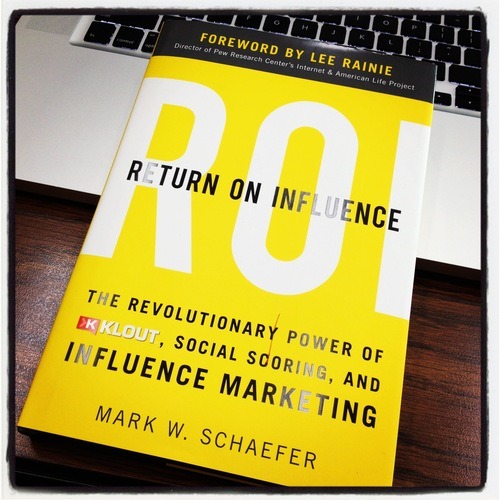
There’s been a great deal of talk recently about how the current iterations of ‘influence’ measurement don’t really measure the actual influence that individuals have over their followers. What they were really doing is simply extrapolating the amount and type of social media activities that the individual engages in, and then repackage them as a superficial measure of influence. For a while though, it’s all we had to use as a yardstick to compare how we were performing in the world of social media communications.
Now, Klout has introduced the +K system, which allows users to manually apply ‘influence’ to individuals based on certain topics of interest. It’s a definite step in the right direction. Now, rather than simply be based on the raw numbers of tweets, followers, and mentions, someone can be marked as influential on a topic based on their CONTENT and the effects that they have on their audience. In my opinion, this is a far more reliable measure of how influential someone is.
Of course, there are loopholes and ways to game the system. The first one that I’ve seen rear its ugly head is people flat out asking their followers to give them +K points. Really? Doesn’t this completely defeat the purpose of the +K system? If your followers don’t take it upon themselves to give you +K on their own volition, perhaps you’re not as influential on your topic as you may think you are.

Image linked from: http://www.socialfresh.com
This got me thinking about what would really be a good reason to give someone a bump with +K. Should you just give them to your friends? Should you give them to the most popular users in hopes that they notice your action and return the favour? Possibly.
But maybe, just maybe, we should be selective in who we give influence points. After all, don’t the people we recommend provide insight in to who we are and what we’re all about? If someone said they are influenced by some loudmouth malcontent who just posts drivel and garbage, my opinion of them may decline a little bit. Who we look up to is indicative of how we strive to be, so in the long run excessive generosity with +K points could reflect poorly on you.
Here are what I believe are 5 great reasons to give someone +K:

Image linked from: http://cooleycooley.blogspot.com
1 – They fascinate you
If someone continually posts articles that you absolutely must read, they may be deserving of +K. If they have a lifestyle or philosophy that you admire, they may be deserving of +K.
2 – They make a difference
If someone you follow is generous in their community, helping everyone without thought of reward, they may be deserving of +K. If someone you follow is dedicated to a charitable cause, and advocates for those who cannot advocate for themselves, they may be deserving of +K.
3 – They give you advice that you use
If you ask a question, and they give you a solution that you can use, and it works, they may be deserving of +K. If you take an article they wrote and actually apply the concepts to your everyday life, they may be deserving of +K.
4 – They are tremendously successful
If they continually win at anything they do, sharing the stories of their success as they go, they may be deserving of +K. If their customers/clients continually win as a result of working with this person, they may be deserving of +K.
5 – They give you ideas you never conceived of
If they share a new idea or concept that stops you in your tracks and say ‘WOW’, they may be deserving of +K. If they constantly surprise you with solutions to problems never before considered, they may be deserving of +K.
Now, with any type of reward system, however simple it may be, there will always be those who use it in awful ways that make kittens cry. Here are five of those ways:

Image linked from: http://rob.nu
1 – Giving +K to people who are already ranked at the top of a topic
Does giving Barack Obama +K for politics do anything for anyone? Not really. Does giving Starbucks a +K about coffee make others go ‘OK, maybe I’ll try it’? If they haven’t tried it by now, very few things will push them to change.
2 – Giving +K to people because they are your friends
We all want our friends to succeed, but you wouldn’t recommend them for a job they’d be terrible at, so don’t do the same here. If they don’t ACTUALLY influence you on the topic in question, don’t say that they do just to be nice. Everyone has something they’re great at, so if you’re going to give them points, do it on their real topic of influence.
3 – Giving +K to people solely because they gave it to you
It’s a nice gesture, but just don’t. I didn’t give you the +K just to get some from you. I really felt you were influential on a topic so I gave you a bump. If you’re just being nice, then say thanks, or start reading my blog and give me your feedback. Your opinion and comments are far more valuable than a ‘gimme’ to my Klout score.
4 – Giving +K to people to farm for your own +K
As indicated above, there are those who like to reciprocate when given appreciation, which isn’t necessarily a bad thing, but in this instance it does more harm than good. If you purposely look for those individuals known for reciprocating and give them +K just to get more for yourself, you’re just gaming the system.
5 – Giving +K to gain popular Twitter followers
No secret: It’s hard to get the attention of some of the big Twitter personalities out there. Really, really hard. They get countless mentions and replies every day, so how do you break through the clutter? By doing something ‘extra’. Giving someone who is really popular a shot of +K could be the ‘nudge’ you need to get them to follow you back. If this is the only reason you’re doing it, then you’re flat-out doing it wrong. Do you really want to get followers by cheating? (Hint: Please say ‘no’.)
So there you have it. For the first time, measures of online influence can finally have some kind of ‘meat’ to them. But just like any other metric, they can easily be skewed to the advantage of unscrupulous individuals, rather than used for their intended purpose. I sincerely hope that the majority of users out there really make use of the +K system as the creators of it clearly intended: To place the power of real influence measurement in to the hands of the community. We finally have the ability to effectively gauge influence based on the effects of the content being produced. Let’s not ruin it, ok? Thanks!










